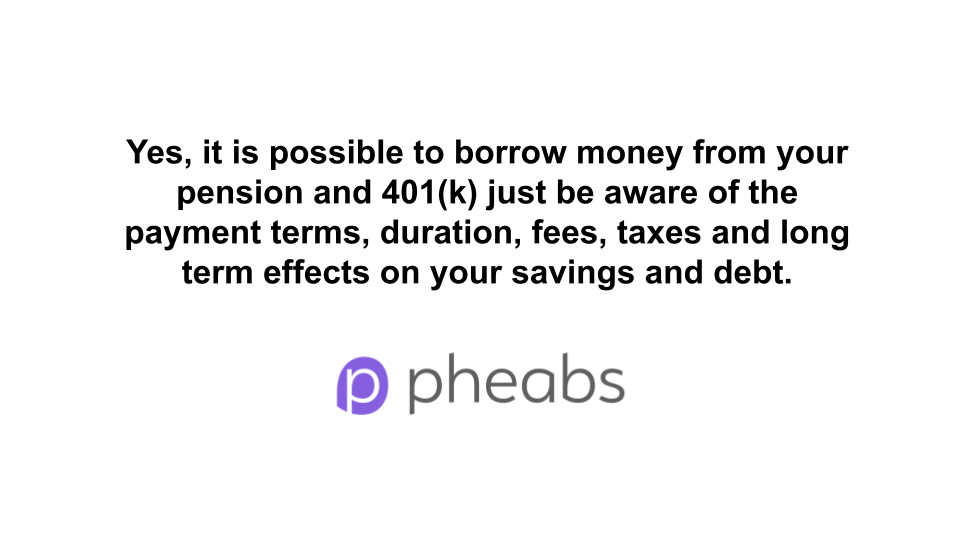Yes, there are ways to borrow money against your pension plan or 401k in the form of lump sump advances, pension sales or pension buyouts.
If you need to borrow money to pay off some debts and have tried all other options, you may find the use of your pension to be attractive, especially if you have built up $50,000 or $100,000 in savings and want to use this.
However, experts do raise the potential risks of doing this, because your pension is designed to fund your retirement and taking out money from your pension or 401(k) will incur fees, be liable for a tax payment and reduce your overall life savings amount.
How Can I Get a Loan Against My Pension?
Being able to get a loan against your pension will depend on the type of pension you have and the terms and conditions set out by your employer. Your pension is often arranged through a scheme that you pay into your employer and some have very straightforward rules that allow you to extract money from them and others say you cannot. Either way, you will technically be borrowing the money from your pension, but it will be through your employer. See also our guide on can I ask my employer for a loan?
The general rule in terms of how much you can borrow is up to 50% of your overall pension or savings, with a maximum cap of $50,000.
When applying for a pension advance or loan from your pension, be sure to double check:
- The interest rates charged
- Any additional fees
- How often you will need to make payments
- How long the loan term is (e.g 12 months or 5 years)
What Are The Types of Pensions That You Can Borrow Money From
- Contributions Pension – including company, personal and stakeholder pensions
- Local Government Pension Schemes – for people who work in local governments
- Benefit Schemes – private or public sector funded salary pensions
Can I Use a Pension Loan To Pay Off My Debts?
Yes, if you are 55 years or over, you can transfer your pension out to pay off your debts, such as outstanding mortgage, credit cards, personal loans and more.
However, this assumes you are not paying into any other personal or company pensions and you are still able to continue working and not except due to health reasons.
Importantly, if over 55, you can take out 100% of the pension amount, but only the first 25% is tax free and the rest you take out will be subject to tax.

Can I Borrow Money Against My 401(k)?
Yes, you can borrow from your 401(k) which is effectively taking money from your own retirement savings and then paying the money back in. It is like borrowing money from your future self. Whilst there are rules, it is not as strict or damaging if you fail to repay.
There are a lot of benefits to this including:
- No tax
- No impact to your credit score if you fail to repay
- No withdrawal fees
- All repayments go back into your pot
The main benefit is although you will be required to pay back the loan amount and interest, this both goes into your pot, which is financially sensible, because your pot will be growing rather than paying the money to a provider and losing it.
There will usually be a timeframe that you need to pay it back, such as 12 months or 5 years and any missed payments will not impact your credit score.
The downside is that your lose any potential growth from the money staying in there that could be invested and you may have to pay off the full loan if you need to leave your job.
Important Terms and Conditions To Look Out For
- You can take money out of your pension as an advance even if you are under 55
- You may need to have worked a certain number of years before your employed lets you access your pension
- Withdrawal fees and taxes will usually apply
- The first 10% or 25% of the money you withdraw from your pension may be tax free, but the rest may be subject to tax. If you take out a large sum, it could put you in a higher tax bracket and be subject to a higher tax payment
So is Borrowing From Your Pension or 401(k) a Good Idea?
Yes and no. It certainly can be a good way to access cash and paying off any pressing debts and there are less rules and restrictions if you are over 55.
The downside is that borrowing against your pension can obviously impact your overall savings and take away money that you could really need later on in life. When some of this will be lost to tax, that will be a real shame because it is income that you worked hard for and earned.
If you need to borrow large sums for emergencies (see emergency loans) or huge debts, you should always consider alternatives such as using credit unions, secured loans, selling things you do not need, borrowing from family and friends and speaking to a debt professional.




